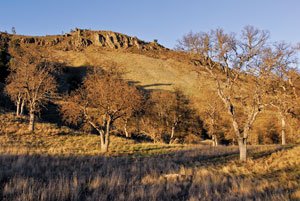
Governor Jerry Brown recently signed two major legislative measures that mandate a number of funding and oversight improvements to California State parks, but the road to regaining the faith of a group of local outdoor enthusiasts – who fundraised a quarter of a million dollars to keep Henry Coe Park in South County open to the public – is going to be an arduous hike.
The legislation comes on the heels of an internal investigation in July, which revealed the parks finance department was actually sitting on an “underreported” cache of $54 million that dates back 12 years. Approximately $20 million of that belonged to the general purpose State Parks and Recreation Fund, which is intended to support the general operation of state parks.
The scandal erupted the same year 70 state parks were threatened with unprecedented mass closure in 2012 due to massive state budget cuts.
Grassroots advocate groups such as the Coe Park Preservation Fund (CPPF), a volunteer organization that formed in an effort to keep Henry Coe Park open, were outraged by the discovery. They demanded the return of $279,000 in donations solicited by CPPF members to keep Coe open, if the government didn’t return the found $20 million.
On Sept. 25, Gov. Jerry Brown signed Assembly Bill 1479. The legislation follows the recommendation that Brown return the $20 million in “found” funding. Additionally, the bill would “strengthen” the State Park and Recreation Commission by establishing criteria for membership on the commission.
Brown also signed AB 1589, the California State Park Stewardship Act of 2012. This would require the parks department to develop a prioritized action plan, including revenue-generating opportunities, by July 1, 2013.
CPPF members, which includes Morgan Hill resident and restaurateur Dan McCranie, are “cautiously optimistic.”
They’re waiting to see if the government will actually follow through on returning the $20 million.
“We, along with all of other (grassroots) organizations, are finding that our donations have just completely dried up because people are very hesitant to continue to give money to be used by a department that has such poor bookkeeping,” notes CPPF Board President Ann Briggs, a Palo Alto resident and avid Coe hiker/volunteer since the 70s.
Last year, CPPF inked a memorandum of understanding with the parks department that will keep the wilderness gem open and staffed for three years. The trust in that working relationship has been badly damaged by recent events, Briggs says.
When asked if the CPPF still plans on demanding for the donations to be returned, Briggs says that remains to be seen. The CPPF feels the donations were collected under “false pretenses,” she explains. Members feel “honor-bound” to offer the money back to the donors.
“To be a little bit more blunt,” she continued, “the parks department just has a poor track record when it comes to being honest about their dealings. All of us were hoodwinked by it. There is going have to be a lot of work on the department’s end to bring back that trust.”












